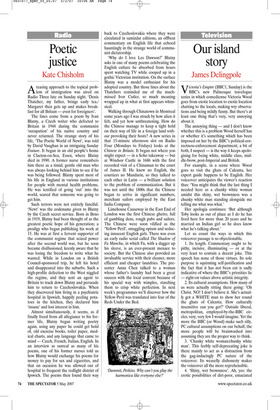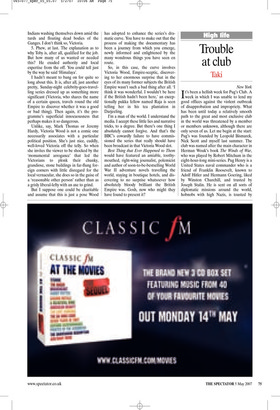Our island story
James Delingpole
Victoria’s Empire (BBC1, Sunday) is the BBC’s new Palinesque travelogue series in which comedienne Victoria Wood goes from exotic location to exotic location chatting to the locals, making wry observations and being mildly funny. But there’s at least one thing that’s very, very annoying about it.
The annoying thing — and I don’t know whether this is a problem Wood herself has or whether it’s something which has been imposed on her by the BBC’s political-correctness-enforcement department; a bit of both, I suspect — is the way it keeps apologising for being white, middle class, middle-brow, post-Imperial and British.
For example, in a scene where Wood goes to visit the ghats of Calcutta, her expert guide happens to be English. Her voiceover anticipates the viewer’s reaction thus: ‘You might think that the last thing I needed here as a chunky white woman amidst this shiny, wet brownness was a chunky white man standing alongside me telling me what was what.’ Her apologia continues: ‘But although Toby looks as out of place as I do he has lived here for more than 20 years and he married an Indian girl so he does know what he’s talking about.’ Let us count the ways in which this voiceover passage is so objectionable.
1. Its length. Commentary ought to be pithy, incisive, illuminating — or at the very least to contain a decent joke. This speech has none of those virtues. Its sole purpose is squirming self-justification and the fact that it has not been cut is sadly indicative of where the BBC’s priorities lie — right-on values above artistic integrity.
2. Its cultural assumptions. How many of us were actually sitting there going: ‘Oh Christ. NO! I don’t believe it. She’s actually got a WHITE man to show her round the ghats of Calcutta. How culturally insensitive can you get?’ Outside liberal, metropolitan, employed-by-the-BBC circles, very, very few I would imagine. Yet the more the BBC (or Wood) make such silly, PC cultural assumptions on our behalf, the more people will be brainwashed into assuming they are the proper way to think.
3. ‘Chunky white woman/chunky white man’. This feebly self-deprecating joke is there mainly to act as a distraction from the gag-inducingly PC nature of the voiceover. Its weaselly dishonesty makes the voiceover all the more reprehensible.
4. ‘Shiny, wet brownness’. Ah, yes: the erotic possibilities of dirt-poor, emaciated Indians washing themselves down amid the turds and floating dead bodies of the Ganges. I don’t think so, Victoria.
5. Phew, at last. The explanation as to why Toby is, after all, qualified for the job. But how many of us wanted or needed this? He exuded authority and local expertise from the off. You could tell just by the way he said ‘Himalaya’.
I hadn’t meant to bang on for quite so long about this. It is, after all, just another pretty, Sunday-night celebrity-goes-travelling series dressed up as something more significant (Victoria, who shares the name of a certain queen, travels round the old Empire to discover whether it was a good or bad thing). Then again, it’s the programme’s superficial innocuousness that perhaps makes it so dangerous.
Unlike, say, Mark Thomas or Jeremy Hardy, Victoria Wood is not a comic one necessarily associates with a particular political position. She’s just nice, cuddly, well-loved Victoria off the telly. So when she invites the viewer to be shocked by the ‘monumental arrogance’ that led the Victorians to plonk their chunky, grandiose, stone buildings in far-flung foreign corners with little disregard for the local vernacular, she does so in the guise of a ‘reasonable other person’ rather than as a grisly liberal-lefty with an axe to grind.
But I suppose one could be charitable and assume that this is just a pose Wood has adopted to enhance the series’s dramatic curve. You have to make out that the process of making the documentary has been a journey from which you emerge, newly informed and enlightened by the many wondrous things you have seen en route.
So, in this case, the curve involves Victoria Wood, Empire-sceptic, discovering to her enormous surprise that in the eyes of its many former subjects the British Empire wasn’t such a bad thing after all. ‘I think it was wonderful. I wouldn’t be here if the British hadn’t been here,’ an exceptionally pukka fellow named Raja is seen telling her in his tea plantation in Darjeeling.
I’m a man of the world. I understand the media. I accept these little lies and narrative tricks, to a degree. But there’s one thing I absolutely cannot forgive. And that’s the BBC’s cowardly failure to have commissioned the series that really should have been broadcast in that Victoria Wood slot.
Best Thing that Ever Happened to Them would have featured an amiable, toothymouthed, right-wing journalist, polemicist and author of soon-to-be-bestselling World War II adventure novels travelling the world, staying in boutique hotels, and discovering to no surprise whatsoever how absolutely bloody brilliant the British Empire was. Gosh, now who might they have found to present it?



































































































 Previous page
Previous page